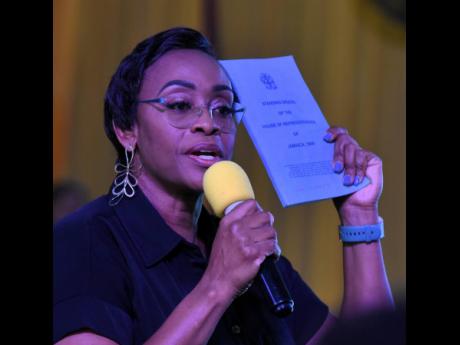Editorial | The Speaker’s obligation
If, as expected, Juliet Holness is elected Parliament’s Speaker today, she will have an opportunity, and obligation, to rescue the role from the disaster into which it has descended in recent times.
That, however, will require more than prescriptive or robotically rigid adherence to the Standing Orders, or the rules that govern the legislature, but also a capacity for empathy, a deep commitment to fairness, and, critically, an appreciation that the job lifts her - or ought to - above the partisan fray.
In that regard, Ms Holness, the wife of the prime minister, Andrew Holness, has to embrace, and internalise, an idea that her predecessor, Marisa Dalrymple-Philibert, clearly failed to grasp during her three years in the chair, which cost her the full respect of the House and large swathes of external observers. Against this backdrop, we will keenly observe Ms Holness’ application of her pledge to take a firm grip of the House “in keeping with the Standing Orders”.
Which is what Ms Dalrymple-Philibert declared was her aim up to the time of her demise under the weight of accusations by the Integrity Commission that she lied, in her income, assets, and liabilities filings, by failing to report ownership of a motor car bought with a duty concession. It also suggested that the concession regime may have been abused.
With respect to the Speakership, Ms Dalrymple-Philibert’s failure was her inability to cross the psychological hurdle from being a member of parliament for the governing Jamaica Labour Party (JLP) to being Speaker.
The latter role demands impartiality, if not neutrality, which she didn’t manage.
In the United Kingdom, the situation is made easier for the Speaker of the Commons, who, by convention, implicitly leaves his or her party while in the job. Usually, their seats are not challenged at elections.
NO SUCH CONVENTION
There is no such convention in Jamaica. The Speaker remains ensconced in his or her party. Therefore, transcending the tribe and lifting oneself above the partisan divide becomes a profoundly personal, and personally moral, endeavour, of which there is little expectation from the side from which the Speaker comes.
Ms Holness has said that part of the problem with the functioning of Jamaica’s Parliament is that many of the rules have been relaxed without changes to the Standing Orders. She, it seems, intends to operate firmly by the book.
“We must go back to what is the rule or change the rules if we do not believe they meet the purpose of Parliament,” she said.
That argument is fundamentally sound. So we expect to see Ms Holness lead a significant reform of Parliament’s constricting rules that allow the domination of the legislature by the executive and leave too little room for the other members, backbenchers, and the Opposition to hold that lot accountable.
At the same time, good leaders – and Speakers – understand how to exercise flexibility even in the context of the rules, as well as the need to protect the rights and interests of the minority. They do not always get universal agreement, but, on balance, they command respect.
Whatever else may be said about Greg Christie, it is undeniable that, almost single-handedly, he forced the issue of corruption - and that they could do something about it - into the consciousness of Jamaicans.
-----
A real apology from Christie
Until Greg Christie became the island’s contractor general in 2005, that office, despite the high quality of its previous leaders, was hardly known by Jamaicans or perceived to have much to do with their lives.
With his investigations of the award and execution of government contracts, and his very public announcement that these were being undertaken, Mr Christie helped to lift people’s interest in how taxpayers’ money was spent, and caused fear among many public officials, concerned that their actions would gain the attention of the office of the contractor general (OCG). However, Mr Christie was often accused by his critics of being brash and intemperate, a charge that wasn’t entirely untrue, although he might characterise his attitude as being forthright.
That personality trait has burst through again, for which Mr Christie owes the Government and Jamaicans a fulsome and full-throated apology, if he is to credibly continue in his current position.
Mr Christie is executive director of the Integrity Commission (IC), an anti-corruption agency into which his old office was subsumed. As executive director, Mr Christie isn’t an independent operator. He acts as a bridge to five commissioners and the IC’s sector directors while generally coordinating the administrative work of the commission.
FIERCE ATTACK
In recent times, in the face of critical investigative reports, the IC has come under fierce attack from government legislators who want to severely limit its powers. Apparently, there have been threats to some members of the IC’s staff.
Last week, one of its directors was shot in the agency’s parking lot, ostensibly during a robbery attempt.
Asked about the incident shortly after it happened, Mr Christie responded: “Ask the Government. Ask them what it means.”
That remark is pregnant with implications. That it was made at that time, or against the background of the IC’s requests for increased security for its staff, doesn’t remove the fact that it was intemperate and unprofessional. It worsened the prospect of deepening tensions between the IC, and especially Mr Christie, and the Government.
However, it doesn’t of itself, without more, rise to the level that demands Mr Christie’s resignation, although, if he should go, it would be understandable.
That the IC and Mr Christie said that people’s interpretation of the comment wasn’t what it meant, yet apologised for the remark, doesn’t go far enough.
Mr Christie must give a profound and sincere apology as a start to the necessary repair effort.

